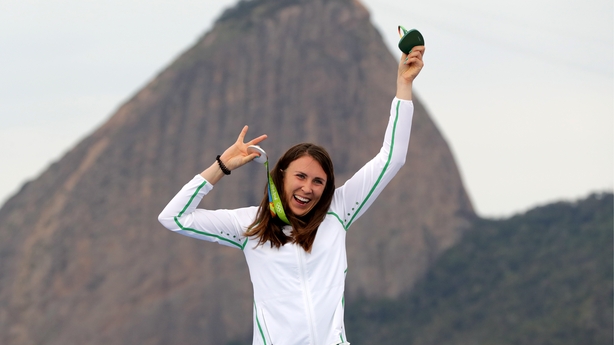Rio 2016 will be an Olympics that will live long in the memory for the medal winning and personal-best achieving Irish athletes, but from an overall Team Ireland perspective, it will go down as a Games to forget.
The episode of Reeling in the Years for 2016, whenever it is made, will need to be double the normal length just to fit in all that went on over the past 17 days in this sprawling Brazilian city.
It started with boxer Michael O’Reilly’s positive drugs test and eventual expulsion from the Games and continued its rollercoaster ride through to Pat Hickey’s arrest for his alleged involvement in ticket-touting.
There were dodgy judging decisions, big-name flops and performances pulled apparently out of nowhere by athletes determined to deliver lifetime achievements on the biggest stage.
When the focus was back on the sport the attention was grabbed by Ireland’s boxers’ implosion and the silver medals won by rowing brothers Gary and Paul O’Donovan and sailor Annalise Murphy.
But how exactly should Rio 2016 be judged in an Irish context?
O’Reilly’s positive dope test, leading to him being the first-ever Irish athletes expelled from a Games, Hickey’s apparent falling-out with Minister for Sport Shane Ross and his subsequent arrest all stunned the nation.
The high hopes of the country’s elite boxers amounted to nothing with medal contenders eliminated long before they got near to the podium.
Katie Taylor, one of Ireland’s greatest sportswomen, lost her only fight, giving a searingly honest interview on RTÉ in the direct aftermath.
Katie Taylor admits it has been a very difficult year as she reflects on losing Olympic crown https://t.co/mrA7PmWJhl
— RTÉ Sport (@RTEsport) 15 August 2016
Her composure was in contrast to the anger of bantamweight world champion Michael Conlan, who, in an equally honest RTÉ interview, let fly at the standard of judging in his sport.
Conlan’s claims would appear to have been backed up by the decision of AIBA (Olympic boxing’s world governing body) to remove certain judges from duty in Rio and the withdrawal of Vladimir Nikitin, the fighter the Belfast man was ruled to have lost to, from his subsequent fight to due in large part to the damage inflicted by Conlan.
The failure of an Irish boxer to win a medal, given the expectation, will require a serious rethink from the IABA ahead of the next four-year cycle for Tokyo 2020.
The judging scandal and Hickey’s arrest has taken the heat off them for the time-being, but they can’t avoid the searchlight indefinitely.
Ireland’s medal successes came from one expected source, Murphy, and one not so expected - the O’Donovans.
The Skibbereen brothers were many people’s highlight of the Games, and not just in Ireland - they got positive press worldwide thanks to their laconic interviews, laid-back style and deep west Cork accents.
Podium pants and pizzas out in Rio but the O’Donovan brothers are missing a 'national holiday' back in Skibb! https://t.co/zkeny9a7my
— RTÉ Sport (@RTEsport) 12 August 2016
Murphy’s silver was all the sweeter given that she just missed out on a medal last time around in London 2012 and dedicated herself completely to fulfilling her dream, rightly making herself a nation’s sweetheart in the process.
Ultimately, the 77-strong team sent by the Olympic Council of Ireland failed to match their projected medal haul in Rio. For some, this could be seen as a failure and the mystifying blank from the boxers certainly was a disappointment.
But generally this could be considered a positive Games for Ireland.

Rowers Clare Lambe and Sinead Lynch made an Olympic final and the smiling Tom Barr stole Ireland’s hearts with back-to-back national records and a scintillating fourth place in the 400m hurdles.
Natalya Coyle finished seventh in the modern pentathlon, Ollie Dingley made the 3m diving final, Matt McGovern and Ryan Seaton reached their 49er class medal race, Judy Reynolds was in the dressage final, Scott Evans progress to badminton’s last 16, the hockey team did the island proud with their performances against the best in the world and athletes like Fionnuala McCormack clocked personal bests.
There might not have been as many medals as hoped for, or even expected - and Irish sport has never dealt well with expectation - but there was a lot of strong results and many of them from unexpected corners.
Ultimately, sport at this level is down to investment. Australia sunk €8 million into every medal they won in Rio and team GB invested nearly €5 million per place on the podium in London four years ago.
Ireland doesn't put that sort of money into sport at any level and, even if it did, it would be questionable whether it would be money well spent.
To expect much more than we got from this Olympics was wishful thinking.
Behind the many controversies, Rio 2016 should be remembered as a Games where Ireland punched its weight in terms of size and investment and for those athletes who, thanks to years of selfless dedication, did themselves proud.



